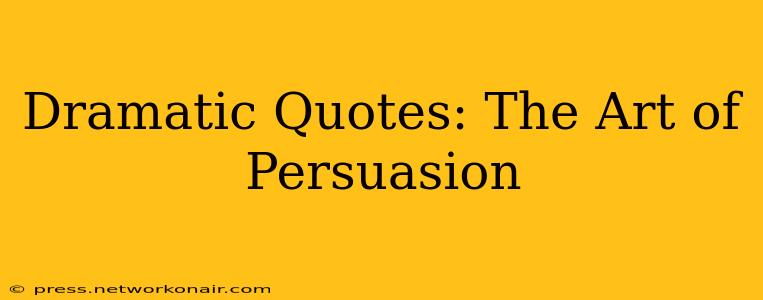Dramatic quotes—those powerful, emotionally resonant phrases that linger in the mind—hold a potent ability to sway opinions and inspire action. They are the cornerstone of effective communication, whether in literature, speeches, marketing, or everyday conversation. This art, however, is more than just stringing together impressive words; it's about understanding the psychology of persuasion and crafting statements that resonate deeply with your audience.
What Makes a Quote Dramatic?
Several elements contribute to the dramatic impact of a quote:
-
Emotional Resonance: A truly dramatic quote evokes strong emotions—fear, hope, anger, joy—connecting with the audience on a visceral level. It taps into their existing beliefs and values, making the message more persuasive.
-
Vivid Imagery: Powerful quotes often paint vivid pictures in the listener's mind, creating a memorable experience. Metaphors, similes, and strong verbs contribute to this imagery, making the message more impactful.
-
Brevity and Impact: The most effective dramatic quotes are concise and memorable. They cut through the noise and deliver a powerful message without being verbose. Think of powerful one-liners that stick with you long after you've heard them.
-
Authenticity: A quote's power is amplified when it feels genuine and authentic. It should reflect the speaker's true beliefs and emotions, avoiding clichés and sounding contrived.
-
Context and Delivery: The context in which a quote is delivered is crucial. A powerful quote delivered with passion and conviction will resonate far more than the same quote read flatly.
How to Craft Your Own Dramatic Quotes
Crafting a truly dramatic quote requires careful consideration and practice. Here's a breakdown of how to develop your skills:
-
Identify Your Audience: Understanding your target audience is paramount. What are their values, concerns, and aspirations? Tailor your quote to resonate with their specific needs and emotions.
-
Choose Powerful Words: Select words with strong connotations and emotional weight. Avoid weak or vague language. Use active voice and strong verbs to create a sense of urgency and impact.
-
Use Figurative Language: Employ metaphors, similes, and other figures of speech to create vivid imagery and make your quote more memorable.
-
Keep it Concise: Brevity is key. A short, impactful quote is far more effective than a long, rambling statement.
-
Practice and Refine: Crafting effective quotes takes time and practice. Experiment with different phrasing, word choices, and delivery styles to find what works best.
How do I use dramatic quotes effectively in my writing?
Incorporating dramatic quotes into your writing elevates its impact. Use them strategically:
- As a lead-in: Start a chapter or section with a powerful quote to grab the reader's attention.
- To support an argument: Use a quote to illustrate a point or add weight to your claims.
- To create emotional resonance: Use a quote to evoke a specific emotion in your reader, such as hope, fear, or inspiration.
- To add memorability: A well-chosen quote can make your writing more memorable and shareable.
What are some examples of famous dramatic quotes?
Numerous iconic quotes exemplify the power of dramatic language. Consider:
- "The only thing we have to fear is fear itself." – Franklin D. Roosevelt – This quote evokes a feeling of reassurance during a time of crisis.
- "Give me liberty, or give me death!" – Patrick Henry – This quote demonstrates powerful conviction and a willingness to sacrifice.
- "That's one small step for a man, one giant leap for mankind." – Neil Armstrong – This quote celebrates human achievement and inspires awe.
These examples demonstrate how carefully chosen words can have a lasting impact. Mastering the art of the dramatic quote is a skill that will enhance your communication and persuasion abilities across various contexts. Remember to focus on emotional resonance, vivid imagery, and authenticity to create quotes that truly resonate with your audience.

